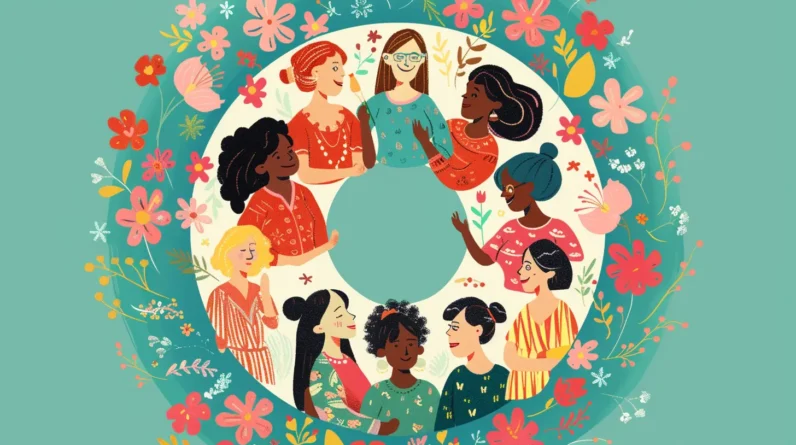
Let’s break the barriers that hinder important discussions about women’s mental health, creating a supportive space where seeking help for challenges like anxiety and depression is encouraged. By sharing personal stories and normalizing conversations, we empower women to prioritize their mental well-being. Through compassionate care and understanding, we validate experiences and provide essential support. Initiating small discussions, educating on symptoms and treatments, and fostering peer networks all contribute to a culture that reduces stigma and promotes seeking help. This open dialogue is key to enhancing awareness and support for women facing mental health issues.
Importance of Open Conversations
Understanding the significance of open conversations surrounding women’s mental health is essential in dismantling barriers and fostering a supportive community. By breaking the stigma associated with mental health challenges, we can create a space where seeking help is encouraged rather than shunned. Women’s health encompasses various aspects, including mental well-being, and addressing mental health issues openly is vital in destigmatizing seeking help for conditions like anxiety and depression. Sharing personal stories can play a significant role in empowering women to prioritize their mental health.
Through compassionate care and discussions, we can create an environment where women feel validated and supported in steering their mental health journeys. Let’s work together to normalize these conversations and promote understanding and support for women facing mental health challenges.
Strategies for Breaking Stigma
To effectively combat the stigma surrounding women’s mental health, we must implement strategic approaches that promote understanding and empathy within our communities. Understanding that mental health conditions are common and legitimate can help normalize conversations, reducing stigma. Educating oneself on symptoms and treatments fosters confidence and facilitates open discussions. Initiating small well-being conversations and actively listening create supportive environments for sharing.
Cultivating peer support networks and advocacy efforts challenging stigmatizing comments are essential. These actions reduce isolation, promote well-being, and challenge societal misconceptions. By fostering supportive environments, encouraging open dialogue, and advocating for change, we can help reduce stigma, enhance women’s quality of life, and build a more empathetic society. Let’s work together to break down barriers and create a more understanding world.
Encouraging Help-Seeking Behavior
Promoting a culture of acceptance and support is essential in encouraging women to seek help for their mental health. Negative attitudes and beliefs, combined with fear of judgment, create a significant barrier for women in accessing the care they need. Normalizing therapy and counseling as part of self-care can help women prioritize their mental well-being, similar to how they approach physical health. Creating supportive environments, like peer support groups, empowers women to seek assistance for their mental health challenges.
Accessibility to mental health services must be promoted to guarantee help is readily available. Encouraging open conversations about mental health among friends and family can help women feel more comfortable discussing their struggles and seeking the help they deserve.
Role of Supportive Networks
Within our healthcare system, the importance of supportive networks for women cannot be overstated. Peer support groups and mentorship programs tailored for women physicians play a crucial role in combating the stigma associated with mental health. These networks offer a platform for sharing experiences, fostering open discussions, and promoting professional growth. By connecting women in medicine, professional organizations create a supportive community where mental health challenges can be addressed openly. Such support systems not only alleviate feelings of isolation but also empower individuals to seek help without fear of judgment.
Through these networks, individuals can find validation, encouragement, and understanding, ultimately contributing to the well-being of women in healthcare. Strong support systems are key in breaking down barriers and promoting mental health awareness in both personal and professional spheres.
Advocacy and Community Engagement
Advocating for women’s mental health involves actively challenging societal norms and fostering understanding to combat the stigma surrounding mental health. During Mental Health Awareness Month, our dedication to caring for individuals from all walks of life is vital. Engaging in community programs can help destigmatize mental health issues and improve mental well-being. By setting boundaries and sharing personal storytelling, we empower each other and create a supportive network.
Together, we can speak out against stigmatizing attitudes and educate others about the realities of women’s mental health challenges. Collaborating with healthcare professionals and community members is essential in promoting awareness and ensuring women feel valued and empowered to seek help. Let’s continue to advocate, engage, and support each other on this journey towards mental health wellness.
Conclusion
Let’s continue to break the stigma surrounding women’s mental health by talking openly and supporting each other. For instance, Sarah bravely shared her struggles with anxiety at a gathering, sparking a meaningful conversation that led to others opening up about their own experiences. This ripple effect of openness and support can create a safe space for women to seek help and feel understood.
Together, we can make a difference in promoting mental well-being for all!







